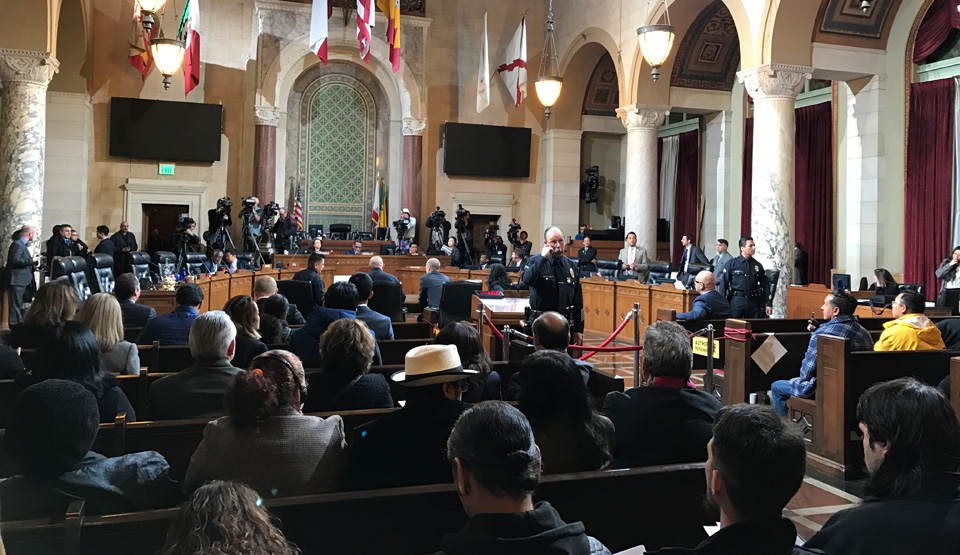
LOS ANGELES — City Hall rocked with indignation Wednesday night as hundreds of concerned Angelenos packed the chamber to hear what the City Council’s newly formed Immigration Committee had to say. Earlier in the day, Donald Trump had issued executive orders announcing a sweeping new series of anti-immigrant measures that have sent the immigrant community into a tailspin. The evening also afforded an opportunity for speakers from the general public to weigh in.
The City Council has come a long way since decades ago when it was an all-white preserve dedicated to protecting privilege. Its 15 members today include four Latinos (two of whom are immigrants), one Asian-American (a South Korean immigrant), three African Americans, Jews, gays, a member of the Wyandotte Native American tribe, and one Republican. There is strong labor support on the Council.
The formation of the Immigration Committee was announced several weeks ago, with an inaugural open session on January 25th. City Councilmembers could not have predicted that on that day, in his first week in office, Trump launched his first major attacks against immigrants. He announced that he would build the wall along the border with Mexico that he promised his followers during the campaign, ramp up immigration and border enforcement by hiring thousands of new officers, build new detention centers, and deny federal funding to sanctuary states and cities that protect undocumented immigrants.
Also this week in California, state Senate leader Kevin de León introduced Senate Bill 54, the California Values Act, to create safe spaces and expand protections for undocumented immigrants. This legislation would ban the use of state and local resources for carrying out the work of federal immigration officials in deportation actions.
The pro-immigrant rights community considers this bill a critical step in keeping immigrant families together and standing up for those who are targeted by the Trump administration. If passed, it will set an example for other states and cities to emulate.
In his State of the State speech this week Governor Jerry Brown said, “California has enacted several protective measures for the undocumented…. We may be called to defend those laws, and defend them we will. Let me be clear: We will defend everybody — every man, woman and child who has come here for a better life and has contributed to the wellbeing of our state.”
California, Los Angeles, and at least 40 other jurisdictions in the state are declaring themselves in direct opposition to the xenophobia, and perhaps unconstitutionality, of Trump’s plans.
Opening the session, Councilmember Gil Cedillo cited a visit recently paid to his office by a small businessman who had been a refugee from Nazi Germany. The man expressed support for the immigrants’ cause. “Some people thought we could work with those people,” he said of the Nazis. “It didn’t work out for us.”
We have a choice, Cedillo said: “Resist or collaborate.”
One measure, announced several weeks ago, that the City Council took to protect immigrants, was to hire President Obama’s former Attorney General Eric Holder as a consultant. The City Council has also established a $10 million Los Angeles Justice Fund to ensure access to lawyers by anyone under threat from Trump’s anti-immigrant policies.
Cedillo affirmed that what is needed is “institutional resistance” to respond to the the challenges of this “extraordinary moment in the history of our nation and city.” Our immigration policy here will be what the federal policy should be: “fair, generous and flexible.”
Other councilmembers spoke as well. Curren Price, an African American, said, “We are standing at the edge of a precipice and it’s a long way down. We will not sit back and allow the president to take these measures. We will not be moved. We will not let you tear our communities apart. We the people of Los Angeles will not remain silent.”
Councilmember David Ryu, originally from Korea, called Trump’s plan “harmful, hurtful and maybe unlawful.” With three million immigrants in Los Angeles, he said, we are “obligated to hold open the door of opportunity to others.” Councilmember Nury Martínez, originally from Mexico, expressed concern especially for the children. “We have a lot of work to do and we have to get busy.”
Councilmember José Huizar, whose family came undocumented from Zacatecas, Mexico, spoke of Order 40 in the L.A. Police Department, the rule saying that in conducting police work, officers are not permitted to ask for papers reflecting immigration status. Law enforcement officials long ago concluded that they could not expect cooperation in solving crime if neighbors and witnesses feared talking to the police over their legal situation. This fight, Huizar said, is not just to protect immigrants — this affects everyone. “We are on the right side morally, economically, socially.”
An un-American reality
A number of speakers representing important civic organizations followed to offer their thoughts. First up was Rusty Hicks, secretary treasurer of the L.A. County Federation of Labor. “Today,” Hicks remarked, “Los Angeles is showcasing the best of what the United States has to offer,” naming Trump’s latest pronouncements “an un-American reality.”
Spokespersons also read statements from the police department, the Los Angeles Community College District and the School Board — “Our schools are safe zones for every student” — from former City Councilmember Mike Hernandez, and from immigrant rights organizations representing Asian, Latin American, Mexican and Central American communities. All objected to the audacity of a president trying to pass laws singling out Americans, or groups of immigrants, according to religion, nationality or ethnicity. This country has not seen such a thing since the internment of Japanese Americans during World War II.
Angelica Salas, speaking for CHIRLA (Coalition for Humane Immigrant Rights of Los Angeles), referred to the history of sanctuary cities going back to the Reagan era when U.S.-sponsored civil war racked the societies of several Central American nations and millions fled the violence.
Ismael Parra, who has written articles for People’s World, clarified that most of the refugees coming here were escaping from war and poverty caused by the same forces of money that are now well represented in the Trump administration.
Salvador Sanabria, executive director of the immigrant rights organization El Rescate, spoke of Trump’s intention to drive a wedge between Mexicans and Central Americans, saying that in the forthcoming NAFTA renegotiation talks that Trump will be conducting with Mexico, Central Americans will be made the scapegoat. “New detention centers,” Sanabria warned, “will become new concentration camps.”
Betty Hung, policy director of Asian Americans Advancing Justice, called Trump’s executive order “nothing less than an attack on the American values of liberty, justice and equality for all.” She also voiced support for California Senate Bill 31, introduced by Ricardo Lara, which would prohibit the state from sharing information to a federally compiled registry of Muslims in the United States, a proposal Trump has frequently raised.
If California, the most populated state, and Los Angeles, the second most populated city in the nation and its largest single county, can remain strong in resisting the cruel onslaught of federal policy, Trump’s agenda of dividing American communities against each other may fail.












Comments